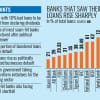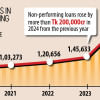Some banks hit by capital squeeze

Bangladesh's banking sector is struggling with a weakened capital base following years of unchecked irregularities during the Awami League's tenure, with a key measure of financial strength falling to a new low.
Fresh data from Bangladesh Bank shows, capital-to-risk-weighted assets ratio (CRAR) across the sector dropped to just 3.08 percent at the end of 2024, below the 10 percent minimum required under the Basel III framework, an international set of reforms. The figure marks a steep decline from 6.86 percent three months earlier and 10.64 percent in June 2023.
While some banks continue to maintain healthy capital buffers, the data reveal a deep divide within the industry. State-owned, Islamic Shariah-based, and specialised banks have seen deeper deterioration in their financial positions, whereas private commercial banks and foreign banks remain on firmer ground.
At the end of December, state-run banks posted a CRAR of negative 8.42 percent, Islamic banks stood at negative 4.95 percent, and specialised banks at negative 41.02 percent.
In contrast, private commercial banks recorded a CRAR of 10.98 percent, and foreign banks posted a strong 42.09 percent, far above the minimum requirement under the Basel III framework, central bank data shows.
CRAR measures the ratio of a bank's capital to its risk-weighted assets, which are assets that have been weighted based on their riskiness.
Industry insiders said that the capital shortfall of banks can threaten the stability of the entire financial sector.
They also noted that investors and depositors lose trust in the affected banks, and the credit ratings of those banks can be downgraded, making it harder and more expensive for them to raise funds.
A senior official at the central bank said the scale of bad loans came to light after the August 2024 political transition, exposing the scale of losses that had been accumulating beneath the surface. This revelation, he added, pushed many banks into deeper capital shortfalls.
By the end of the year, 19 banks, including six state-owned lenders, faced a combined capital shortfall of Tk 1,71,700 crore, the highest on record. The surge was largely driven by an unprecedented rise in non-performing loans, which climbed to Tk 3,45,765 crore.
The central bank official warned that many of the affected banks are now operating at a loss and may struggle to continue lending. "They often cut back on lending to preserve capital," he said.
In the wake of the political transition, several banks have been newly added to the list of undercapitalised institutions. These include Islami Bank Bangladesh, First Security Islami Bank, Social Islami Bank, IFIC Bank, Union Bank, Global Islami Bank and Al-Arafah Islami Bank, most of them exposed to politically connected groups that flourished under the previous government.
Contacted, Arief Hossain Khan, executive director and spokesperson of Bangladesh Bank, said that provision shortfalls spiked as defaulted loans surged, worsened by factory closures whose owners fled or were jailed. As a result, the capital shortfall increased several times.
Banks are mandated to allocate a certain percentage of their operating profits as provisions against loan losses, and if these provisions are insufficient, it can lead to a shortfall.
Janata Bank saw its capital shortfall swell to Tk 52,890 crore by end-2024, driven by Tk 67,148 crore in bad loans—72 percent of its disbursed portfolio. Major defaulters include Anontex, Crescent, Beximco, Thermax, and S Alam Group, who collectively owe over Tk 45,000 crore, according to BB data.
Among other state-run banks, Bangladesh Krishi Bank faced a Tk 18,188 crore capital shortfall at the end of 2024; Rupali Tk 5,100 crore; Agrani Tk 4,685 crore; BASIC Tk 3,150 crore; and Rajshahi Krishi Unnayan Bank Tk 2,400 crore.
The state-run lenders have now become unable to provide large loans under the existing single borrower exposure limit rules due to their high capital shortfalls.
Among private commercial banks, Union Bank's capital shortfall stood at Tk 15,689 crore; First Security Islami Bank Tk 13,991 crore; Islami Bank Tk 12,885 crore; Social Islami Bank Tk 11,708 crore; IFIC Bank Tk 9,000 crore; and National Bank Tk 7,700 crore.
In addition, Padma Bank had a Tk 4,900 crore shortfall; Global Islami Bank Tk 2,900 crore; ICB Islamic Bank Tk 1,900 crore; Bangladesh Commerce Bank Tk 1,600 crore; Standard Bank Tk 1,500 crore; AB Bank Tk 500 crore; and Al-Arafah Islami Bank Tk 250 crore.
Speaking to The Daily Star, Shafiuzzaman, managing director of Social Islami Bank, proposed easing provisioning rules, selling frozen S Alam-related shares, and issuing rights shares once conditions stabilise.
A chief executive of a private commercial bank, seeking anonymity, also said the capital shortfall will decrease if the central bank allows a deferral facility for maintaining provisions. However, weak and problematic banks used such regulatory forbearance to hide capital shortfalls during the previous government's tenure, he added.
Zahid Hussain, a banking reform task force member and former World Bank lead economist in Dhaka, told The Daily Star that recapitalisation is the easiest fix, and it can proceed under reform initiatives, including the passage of the Bank Resolution Ordinance.
He, however, warned against pouring funds into mismanaged banks. "Mismanagement, irregularities, and corruption must be rooted out from troubled banks before the government considers recapitalising them."

 For all latest news, follow The Daily Star's Google News channel.
For all latest news, follow The Daily Star's Google News channel. 






Comments